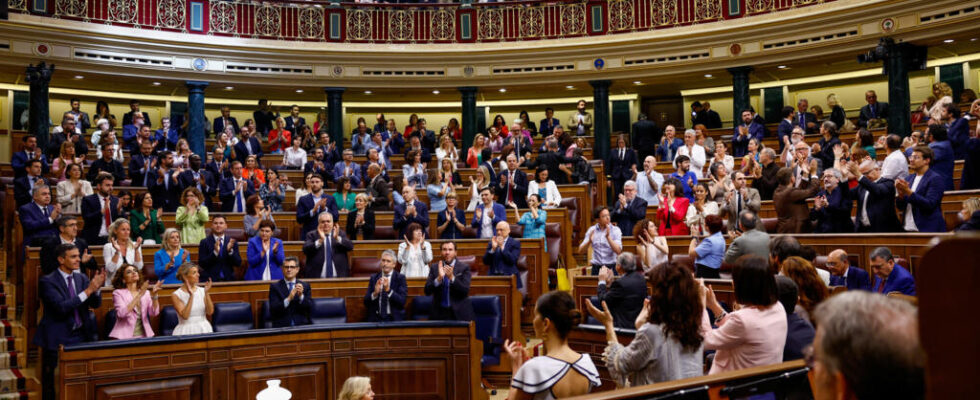This Thursday, May 30, the Spanish government led by the Socialists definitively approved the very controversial amnesty law which grants pardons to dozens of Catalan separatist leaders. After six months of peregrination, and notably the veto of the Senate, this legislation was narrowly approved by 177 votes for, and 172 against.
2 mins
In Spainthe People’s Party (PP), the main opposition party, and the far-right party Vox delivered a last stand before the vote, and denounced what they described as ” political corruption “. For the leader of the PP, Alberto Núñez Feijóo, it is “ of an exchange of power in return for impunity “. “ You will amnesty your inauguration partners simply to stay in power “, for his part, affirmed the leader of Vox, Santiago Abascal. His remarks triggered a violent reaction from the benches of the extreme left and the socialists, from which burst forth “ fascists “Or ” pro-Nazis ».
“ The question, still open, is: how much is impunity worth? Today we witnessed the death certificate of the Spanish Socialist Workers Party “, added Alberto Nuñez Feijoo shortly after the vote on the amnesty law, says RFI’s correspondent in Madrid, Francois Musseau. This law is therefore considered immoral by the right, because it would have been passed to ensure the essential support of Catalan separatists for the left-wing government of Pedro Sanchez.
Read alsoSpain: Catalan separatists fiercely negotiate their support for Pedro Sanchez
On the right, we are so furious that several regions led by the conservatives have announced that they will file appeals for non-compliance with the Constitution. On the socialist side, we are obviously happy and relieved. But it is even more so among the Catalan separatist parties, as expressed by the spokesperson, Gabriel Rufián: “ Today is good news for an entire country. For its democracy and for its freedom. Next step: referendum! »
Pedro Sánchez, for his part, believes that the amnesty aims to put an end to the instability born from Catalonia’s aborted attempt to unilaterally proclaim its independence in October 2017. The regional government of Carles Puigdemont had in fact organized a referendum on self-determination, despite its ban by the courts.
In politics, as in life, the lost is more powerful than the rencor.
How Spain is more prosperous and more united than in 2017.
Convivencia se abre camino.
— Pedro Sánchez (@sanchezcastejon) May 30, 2024
This amnesty law is therefore now a reality, but it has not finished dividing the country. The opposition recalls as soon as it can that Pedro Sánchez himself had expressed his refusal of an amnesty during the campaign for the July 23 elections, before parliamentary arithmetic forced him to change his mind.
Carles Puigdemont, who now resides in the south of France, should be the first beneficiary of this amnesty law. In total, around 400 people are affected.
Read alsoElections in Catalonia: Carles Puigdemont, whatever the result “kingmaker in Barcelona and Madrid”
